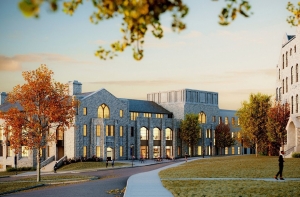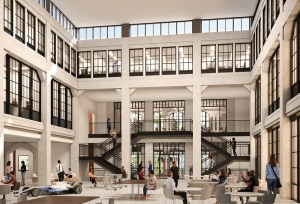Villanova University Announces Plans for Major Transformation of its College of Engineering, Providing Expanded Space for Interdisciplinary Research and Teaching Facilities

VILLANOVA, Pa.—Villanova University President the Rev. Peter M. Donohue, OSA, PhD, today announced plans for a 150,000 square-foot addition to the College of Engineering’s primary academic building, the Center for Engineering Education and Research. This major space expansion reflects a bold 21st-century vision for the College that will dramatically transform the facility, strengthening one of the University’s key STEM spaces and furthering Villanova’s commitment to interdisciplinary research and innovative teaching and learning.
“We know that facilities play a significant role in the overall student experience, which is why upgrading and modernizing our academic spaces is a key focus of our current Strategic Plan, Rooted. Restless.,” said Father Donohue. “In true Villanova fashion, every aspect of the project—from the placement of faculty offices to lab configuration and gathering spaces—is the result of a collaborative process aimed at fostering connections and facilitating collaborative discovery and cross-disciplinary advances.”
The 150,000 square foot addition will more than double the existing 90,000 square foot building, resulting in a 63% increase in overall teaching and research lab space—allowing all the College’s departments to be in one location.
Features of the building addition will include:
- 11 flexible laboratory spaces designed for multi-disciplinary teams to work together on topical areas of research.
- State-of-the-art instruction spaces that can adapt to various teaching and lecture formats.
- A two-story Innovation Lab, which will include workspaces, tools and equipment for building, and space to accommodate large-scale project work.
- Various sustainable design features to support the Villanova and College of Engineering commitment to sustainability, including a green roof for teaching and research, instrumented with smart systems to collect and monitor climate and soil moisture data.

“This important project will allow the College's facilities to match the impressive achievements and contributions of our Engineering faculty, staff, students and alumni,” said Michele Marcolongo, PhD, Drosdick Endowed Dean of the College of Engineering. “Interdisciplinary collaboration is a key aspect of the engineering experience at Villanova and this transformation will create even more opportunities for formal and informal partnerships. The project will add new state-of-the-art instruction spaces for team-based ‘learning by doing’ and will expand our research facilities in ways that will foster collaboration among disciplines.”
The University will break ground on the $125 million project in Spring 2022, with the expansion scheduled to be completed by Fall 2024. The project was designed by BLTa—A Perkins Eastman Studio and Robert A.M. Stern Architects, LLP.
For more information on the College of Engineering Building Expansion, visit villanova.edu/CEERexpansion.
About Villanova University College of Engineering: Founded in 1905, Villanova University College of Engineering is committed to an educational program that emphasizes technical excellence and a liberal arts education within the framework of the University’s Augustinian Catholic tradition. The result is rigorously educated, socially grounded, conscientious thinkers and doers who are professionally prepared to make meaningful change in the world.
About Villanova University: Since 1842, Villanova University’s Augustinian Catholic intellectual tradition has been the cornerstone of an academic community in which students learn to think critically, act compassionately and succeed while serving others. There are more than 10,000 undergraduate, graduate and law students in the University's six colleges—the College of Liberal Arts and Sciences, the Villanova School of Business, the College of Engineering, the M. Louise Fitzpatrick College of Nursing, the College of Professional Studies and the Villanova University Charles Widger School of Law. Ranked among the nation’s top universities, Villanova supports its students’ intellectual growth and prepares them to become ethical leaders who create positive change everywhere life takes them. For more, visit www.villanova.edu.
